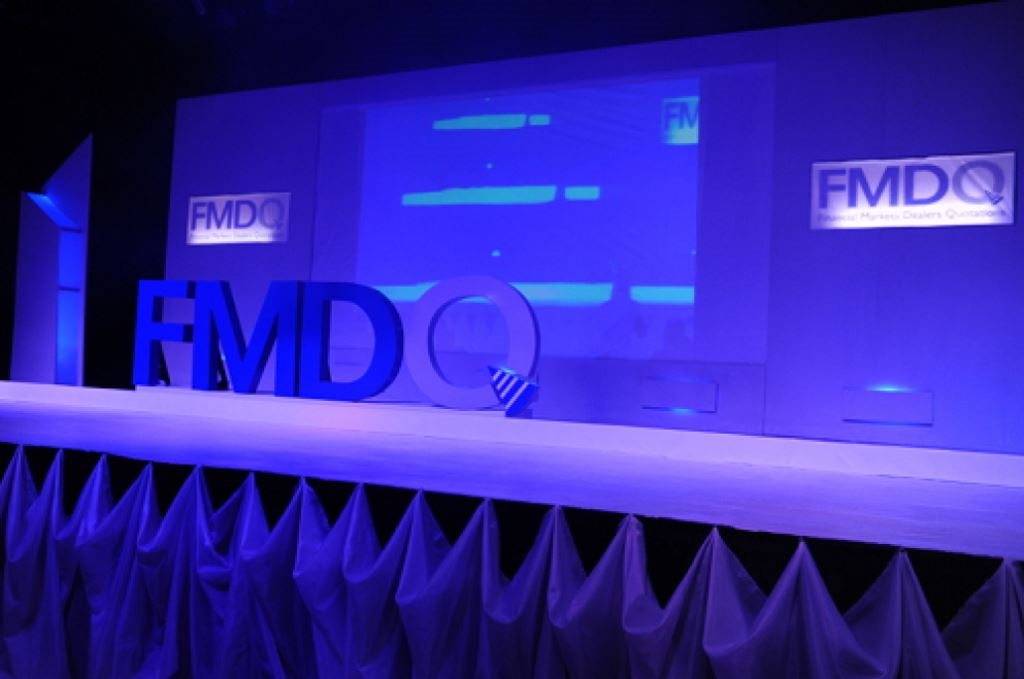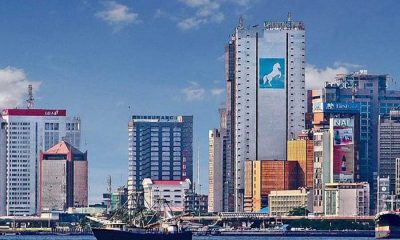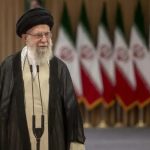Economy
FMDQ Re-Echoes Commitment to Deepen Nigerian Financial Markets

By Dipo Olowookere
Vice President of Capital Markets Directorate at FMDQ, Ms Tumi Sekoni, has reiterated the OTC Exchange’s commitment to support and deepen the Nigerian financial markets by steadfastly availing its platform for the efficient registration, listing, quotation and trading of securities.
Ms Sekoni gave this assurance on Monday at a ceremony held to celebrate the listing of the Stanbic IBTC Dollar, Money Market and Bond Funds (SIAML Funds) on the FMDQ trading platform.
The SIAML Funds, which are open-ended Funds, are set to enable investors achieve competitive returns on their assets while safeguarding capital, by investing in low risk short-term securities, high quality government bonds and dollar denominated securities domiciled in Nigeria.
This is part of FMDQ’s vision of being a debt-capital focused securities exchange, championing and supporting market-driven initiatives aimed at providing liquidity and facilitating growth and development in the Nigerian financial markets.
Speaking further, Ms Sekoni commended the Fund Manager on the strong and consistent performance of the Funds and on taking the prudent and strategic decision to list the Funds on FMDQ’s platform.
In FMDQ’s typically unique and impressive fashion, the ceremony was marked by memorable highlights which included, amongst other activities, the signing of the FMDQ Fund Listing Register by the Fund Manager, sponsor of the Funds on the OTC Exchange and FMDQ; the unveiling of the FMDQ Scrolls in favour of the Fund Manager and sponsor; and the special autograph impression by the Fund Manager.
On her part, Mrs Bunmi Dayo-Olagunju, Chief Executive, Stanbic IBTC Asset Management Limited, during the Fund Manager’s special address, said, “Considering the volatility in the equities and commodity markets, it is imperative for investors to diversify their portfolios by investing in Mutual Funds and other investment vehicles.”
The attractiveness of Mutual Funds or collective schemes, she said, “is derived from the numerous benefits they offer over other investment vehicles, such as flexibility, liquidity, steady returns, professional management and risk reduction, among others”
Speaking on behalf of the FMDQ Registration Member (Listings) and sponsor of the Funds on FMDQ, Mr Kobby Bentsi-Enchill, during his remarks, noted that Stanbic IBTC Capital Limited had sponsored many listings on FMDQ’s platform. He commented that Stanbic IBTC was excited with the remarkable growth of the fixed income market as this was vital to the creation of liquidity and pledged that the organisation will continue to work with regulators and operators to establish a world-class capital market in Nigeria.
“As a Registration Member (Listings) of FMDQ, Stanbic IBTC Capital Limited is also pleased to have supported the listing of the Stanbic IBTC Bond Fund, Stanbic IBTC Dollar Fund and of course, the Stanbic IBTC Money Market Fund which is the largest open-ended mutual Fund in Nigeria,” he said.
Mr Bola Onadele, Managing Director/CEO of FMDQ, commenting on the SIAML Funds, applauded the Fund Manager for its impressive performance in the market and stated that FMDQ remained unflinchingly committed to developing the Nigerian financial markets through its highly efficient platform, promoting unrivalled world-class standards to drive transparency, governance and liquidity, among others, in the markets.
He commented that the Funds, among which was the largest open-ended mutual Fund in the nation, having availed on FMDQ’s world-class listing service, would benefit from improved credibility, as continuous disclosure of all relevant information to do with the Funds was made available to a wide range of investors.
The benefits availed the Funds listed on FMDQ, would also, by extension accrue to the Fund Manager.
Also present at the event were Stanbic IBTC Asset Management Limited, represented by its Chief Executive, Mrs Bunmi Dayo-Olagunju; key representatives from Stanbic IBTC Nominees Limited and investors to the Funds – South Atlantic Petroleum Limited, YOA Insurance Brokers, Nigerian Agip Closed PFA Limited, Chevron Closed PFA Limited, amongst others.
Economy
NASD Exchange Rises 1.22% on Sustained Bargain-Hunting

By Adedapo Adesanya
Strong appetite for unlisted stocks further raised the NASD Over-the-Counter (OTC) Securities Exchange by 1.22 per cent on Friday, February 27.
Data revealed that the NASD Unlisted Security Index (NSI) was up by 49.41 points to 4,083.87 points from 4,034.46 points, and lifted the market capitalisation by N19.56 billion to N2.433 trillion from N2.413 trillion.
The volume of securities bought and sold by investors increased by 243.0 per cent to 4.5 million units from 1.3 million units, and the number of deals grew by 15.8 per cent to 44 deals from 38 deals, while the value of securities went down by 19.7 per cent to N82.5 million from N102.8 million.
Central Securities Clearing System (CSCS) Plc ended the session as the most active stock by value on a year-to-date basis with 35.0 million units valued at N2.1 billion, followed by Okitipupa Plc with 6.3 million units worth N1.1 billion, and Geo-Fluids Plc with 122.8 million units transacted for N480.4 million.
Resourcery Plc ended the day as the most traded stock by volume on a year-to-date basis with 1.05 billion units sold for N408.7 million, followed by Geo-Fluids Plc with 122.8 million units valued at N480.4 million, and CSCS Plc with 35.0 million units traded for N2.1 billion.
There were six price gainers yesterday led by FrieslandCampina Wamco Nigeria Plc, which added N9.02 to close at N111.46 per unui compared with the previous day’s N102.44 per unit, Nipco Plc appreciated by N6.00 to N284.00 per share from N278.00 per share, CSCS Plc recouped N1.87 to sell at N70.12 per unit versus Thursday’s value of N68.25 per unit, Geo-Fluids Plc improved by 17 Kobo to close at N3.18 per share versus N3.01 per share, Industrial and General Insurance (IGI) Plc advanced by 5 Kobo to sell at N50 Kobo per unit versus the preceding day’s 45 Kobo per unit, and Acorn Petroleum Plc chalked up 2 Kobo to settle at N1.34 per share, in contrast to the previous day’s N1.32 per share.
Economy
FX Liquidity Crunch Sinks Naira to N1,363/$1 at NAFEX, N1,370/$1 at Black Market

By Adedapo Adesanya
The Naira performed poorly against the United States Dollar in the different segments of the foreign exchange (FX) market on February 27, closing the week without a gain.
In the black market, the domestic currency weakened against the Dollar yesterday by N5 to close at N1,370/$1 compared with Thursday’s closing price of N1,365/$1, and at the GT Bank forex desk, it lost N2 to sell N1,369/$1 versus the N1,367/$1 it was sold a day earlier.
Yesterday, the Nigerian Naira lost N3.75 or 0.26 per cent against the greenback at the Nigerian Autonomous Foreign Exchange Market (NAFEX) to trade at N1,363.39/$1 compared with the previous day’s N1,359.82/$1.
Also, the Naira depreciated against the Euro at the official market during the session by N2.33 to quote at N1,609.22/€1 versus N1,606.89/€1, and appreciated against the Pound Sterling by N6.74 to settle at N1,836.49/£1 compared with the preceding session’s N1,843.23/£1.
The Naira’s latest depreciation occurred as FX demand continued to outpace available supply, intensifying pressure in the market.
In response to the negative momentum, the Central Bank of Nigeria (CBN) intervened by selling Dollars to banks and other authorised dealers in an effort to stabilise the local currency. The move came barely a week after the apex bank had purchased about $190 million from the foreign exchange market to temper the Naira’s rally.
Specifically, the CBN injected $200 million into the official market between Tuesday and Wednesday through an intervention call. However, the liquidity support proved insufficient to reverse the currency’s downward trend.
Meanwhile, the cryptocurrency market declined on Friday, with Solana (SOL) down by 10.4 per cent to $78.60, as Dogecoin (DOGE) decreased by 9.5 per cent to $0.0982.
Further, Cardano (ADA) slumped 8.9 per cent to $0.2647, Ethereum (ETH) slipped by 8.6 per cent to $1,859.10, Ripple (XRP) shrank by 8.2 per cent to $1.30, Litecoin (LTC) lost 1.4 per cent to close at $52.39, Bitcoin (BTC) slid 5.9 per cent to $63,686.39, and Binance Coin (BNB) went down by 4.9 per cent to $596.64, while the US Dollar Tether (USDT) and the US Dollar Coin (USDC) traded flat at $1.00 apiece.
Economy
Oil Prices Climb on Geopolitical Anxiety

By Adedapo Adesanya
Oil prices rose about 2 per cent on Friday, with traders bracing for supply disruptions as nuclear talks between the United States and Iran were without an agreement.
Brent crude futures settled at $72.48 a barrel after chalking up $1.73 or 2.45 per cent, while US West Texas Intermediate crude futures finished at $67.02 a barrel, up $1.81 or 2.78 per cent.
The two sides agreed to extend indirect negotiations into next week, but traders grew sceptical that an agreement between US President Donald Trump’s administration and Iran was possible.
The US and Iran held indirect talks in Geneva on Thursday after Mr Trump ordered a military buildup in the region.
Oil prices gained during the talks, on media reports indicating that discussions had stalled over U.S. insistence on zero enrichment of uranium by Iran. However, prices eased after the mediator from Oman said the two sides had made progress.
They plan to resume negotiations with technical-level discussions scheduled next week in Vienna, Omani Foreign Minister Sayyid Badr Albusaidi said on X.
Market analysts noted that geopolitical risk premiums of $8 to $10 a barrel have been built into oil prices on fears that a conflict will disrupt Middle East supply through the Strait of Hormuz, where about 20 per cent of global oil supply passes.
To cushion the impact from a possible strike, one of the world’s largest oil producers, the United Arab Emirates (UAE), is set to export more of its flagship Murban crude in April, while Saudi Arabia said it would also increase oil production.
Additionally, Saudi Arabia may raise its April crude price to Asia for the first time in five months due to higher demand from India to replace Russian supplies, potentially raising it by about $1 a barrel.
Meanwhile, the Organisation of the Petroleum Exporting Countries and its allies (OPEC+) is likely to consider raising oil output by 137,000 barrels per day for April at its March 1 meeting, after suspending production increases in the first quarter.
The resumption of output increases after a three-month pause would allow Saudi Arabia and the UAE to regain market share at a time when other OPEC+ members, such as Russia and Iran, contend with Western sanctions while Kazakhstan recovers from a series of oil production setbacks.
Eight OPEC+ producers – Saudi Arabia, Russia, the United Arab Emirates, Kazakhstan, Kuwait, Iraq, Algeria and Oman will meet at the meeting on Sunday.
-

 Feature/OPED6 years ago
Feature/OPED6 years agoDavos was Different this year
-
Travel/Tourism10 years ago
Lagos Seals Western Lodge Hotel In Ikorodu
-

 Showbiz3 years ago
Showbiz3 years agoEstranged Lover Releases Videos of Empress Njamah Bathing
-

 Banking8 years ago
Banking8 years agoSort Codes of GTBank Branches in Nigeria
-

 Economy3 years ago
Economy3 years agoSubsidy Removal: CNG at N130 Per Litre Cheaper Than Petrol—IPMAN
-

 Banking3 years ago
Banking3 years agoSort Codes of UBA Branches in Nigeria
-

 Banking3 years ago
Banking3 years agoFirst Bank Announces Planned Downtime
-

 Sports3 years ago
Sports3 years agoHighest Paid Nigerian Footballer – How Much Do Nigerian Footballers Earn



















